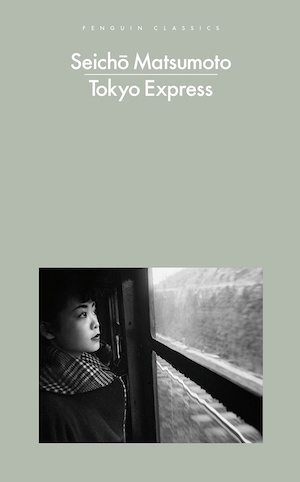
Translated by Jesse Kirkwood –– Penguin’s new translation of Seichō Matsumoto‘s classic Tokyo Express is both modern and respectful of the original Japanese text from 1958, with the action taking place a little earlier in 1957. It’s a book you can immerse yourself in – relax and trust the author to take you on a wonderful journey. An all-time bestseller in Japan, it’s set on the railway line between Tokyo and Hakata – the express route. The writing is beautifully understated, spare, yet elegant. And if that isn’t enough of a hook, the super clever mystery and the endearing detectives at the heart of the case will will mesmerise you.
The deaths of two young people found on the beach near Kashii station and a shrine is initially assumed to be a lovers’ suicide pact. The detective sent to investigate, Jutari Torigai, is not convinced. While his boss wants the matter wrapped up, little details niggle the detective. The dead man, Kenichi Sayama, is an assistant section chief at an unnamed ministry, responsible for procurement and contracts in Tokyo. The young woman, Toki, is a waitress in Akasaka with no obvious connection to Sayama. It emerges that the government official spent the night before his death alone in a hotel. In his wallet, a receipt for a meal on the Tokyo Express reveals he ate alone on the journey.
Torigai is nothing if not thorough. He chats to the customers and staff at Toki’s work. Tatsuo Yasuda, a businessman who often entertains ministry clients at the Koyuki restaurant, is a favourite with the waitresses. Two of them were seeing him off at the station a few days before the deaths. They saw Toki and Sayama together, boarding the train. Toki never returned to work and then the news of her death came. Intuition tells Torigai there’s more to this and he concentrates his efforts on the crime scene, the restaurant and Toki’s past.
Meanwhile, in Tokyo, Torigai’s colleague Kiichi Mihara is a detective in the second division – white collar crime. He’s investigating Sayama and rumours of ministry corruption. Up and down the route of the Tokyo Express, the two detectives tackle the impenetrable puzzle surrounding the murders.
The two detectives, particularly local man Torigai who instigates the investigation, are fiercely determined but also quietly patient. It’s fascinating to see their thought processes in action. You have no doubt that they will unravel the mystery and they are good company as they do so.
Railway murders are a staple of the crime novel but the steel-belt setting is rarely used this well. Japanese crime fiction is famous for paying homage to Britain’s Golden Age mysteries, and Tokyo Express brings a puzzling crime, plenty of clues and red herrings aided by maps and diagrams. The exploration of character and motive are reminiscent of Maigret. The French newspaper Le Monde once called Matsumoto the Japanese Simenon. Yet this novel is so distinctly Japanese and original, the sense of calm and tranquillity it induces in spite of the seriousness of the crimes is remarkable. The murder of the head of a train company in Tokyo shortly after World War II was a significant event in Tokyo and may have helped this story gain traction with local readers.
This story was originally published in instalments in a travel magazine, Tabi, but Matsumoto was notorious for delivering late copy. The editor, frustrated that the print run was being delayed, once tracked down the absent author and had the transport authority detain him when he got off a plane at Itazuke airport to try and squeeze the copy out of him. However it was written, this isn’t just a crime classic, it’s a masterpiece.
For more quiet and considered Japanese mysteries ,try the contemporary author Keigo Higashino. On the flip side of tranquility, but also from Japan, there is Bullet Train by Kotaro Isaka.
Penguin Classics
Print/Kindle/iBook
£5.99
CFL Rating: 5 Stars